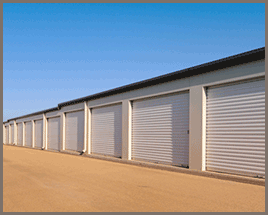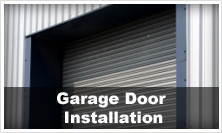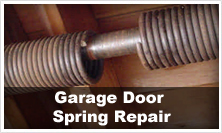Turner Sandy Springs Garage Door, LLC: Extend the Life of Your Garage Door, Tips
 One of the best things ever invented is the automatic garage door opener. Gone are the days when you have to bust your back lifting a heavy double stall garage door. Now with a simple press of a button your garage door easily opens and closes. That’s until you have an issue with one of your garage door springs. Once your garage door springs fail, you will be left without a working garage door. Usually, there will be some warning signs before this happens, here are some ways you can identify garage door spring problems before they fail and cause your automatic garage door to stop working.
One of the best things ever invented is the automatic garage door opener. Gone are the days when you have to bust your back lifting a heavy double stall garage door. Now with a simple press of a button your garage door easily opens and closes. That’s until you have an issue with one of your garage door springs. Once your garage door springs fail, you will be left without a working garage door. Usually, there will be some warning signs before this happens, here are some ways you can identify garage door spring problems before they fail and cause your automatic garage door to stop working.
What Role Does Your Garage Door Spring Play As Far As Opening and Closing the Garage Door?
Before we tell you what to look for as far as potential garage door spring problems, it’s best to tell you how your garage door springs work. That way you will better understand why the potential spring conditions we warn about can lead to some big problems. Garage door springs are most often located on a bar going vertically across about 6” above your garage door when it’s closed.
When it comes to garage door springs it’s all about tension. That’s why they call garage door springs ‘torsion springs’. As a garage door operates your springs twist and this causes tension. That tension actually takes some of the weight of your garage door as its opening and closing. So because of that, your garage door springs make it easier on the other garage door opening and closing equipment to do their job. If it’s a manually operated garage door, the springs make the door feel lighter to whoever is opening or closing it.
Signs of Potential Garage Door Spring Problems
Here are some indicators that potential big garage door spring problems are just around the corner.
- Automatic garage door opener sounds like it’s straining to open the door
As garage door springs age they will lose their ability to coil as tightly as they once did. This in effect makes the garage door heavier to open and close. When this happens the garage door opening system has to work considerably harder. Sometimes this makes a noticeable difference from the normal sound your garage door opening system usually makes.
- The garage door opens a little then suddenly stops
Several brands of garage door openers have load sensors built into them. As we mentioned, when your garage door springs are not working properly they add extra working weight to your garage door opening system. When this weight becomes too great the sensor on the garage opener will shut it down. That’s the reason your garage door will stop after it only raises up a few inches. It takes a few seconds of operation for the garage door opener sensor to kick in once it realizes there is too much weight to pull up.
- Your garage door falls faster than normal when it’s being closed
When your garage door spring is failing it no longer has the tension on it that it’s supposed too. That means your garage door opener has to work harder to handle the extra weight this creates. Sometimes the opening system simply cannot handle the extra weight; this is especially true when the garage door is closing. When this happens the garage door will most likely close faster than it normally does or even drops down with a thud at some point.
- The garage door jerks when going up and down
When a garage door spring wears or is out of adjustment it may cause the garage door to awkwardly buck up and down as its working. This is something that is not only noticeable but it will also make the garage door very noisy as it operates. If the jerking up and down gets bad enough it can cause some serious part failures.
- There is a several inch gap in one part of the garage door spring
This is one of the most obvious signs of garage door spring failure. There may come a time when there is an obvious gap in one part of the spring. If this gap is several inches or more that garage door spring is most likely already broken and will need to be replaced. There is a chance your garage door will not even work at this point.
- A garage door is crooked when going up and down
Some garage doors have more than one spring on them. It’s very possible for one spring to break while the other is still in good working condition. When this happens your door will most likely go up and down in a crooked manner. That means one side will be noticeably higher than the other. Do not use the garage door in this case or you will risk extensive damage to it.
The Best Course of Action If You See a Potential Garage Door Spring Problem
If your garage door spring fails you will not be able to open or close your garage door. You certainly do not want that to happen. It can keep you from getting out of your garage to get to work or force you to leave your garage door open when you are away from home. So how do you avoid this if you see a potential problem with your garage door springs? The answer is to call a local garage door professional.
There are two reasons for this. One is that garage door springs can be very dangerous to work on because of all of the tension that’s placed on them. A professional garage door tech knows how to safely work on garage door springs. Secondly, garage door service providers like Turner Sandy Springs Garage Door, LLC out of Sandy Springs, Georgia have the right know-how and parts to quickly correct any garage door spring problem.
So call a garage door service and repair company at the first sign of any potential spring problems with your garage door.




